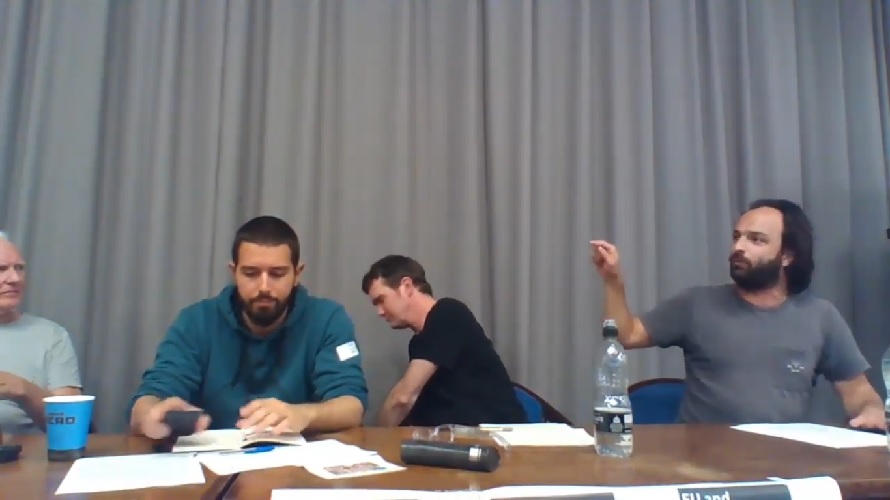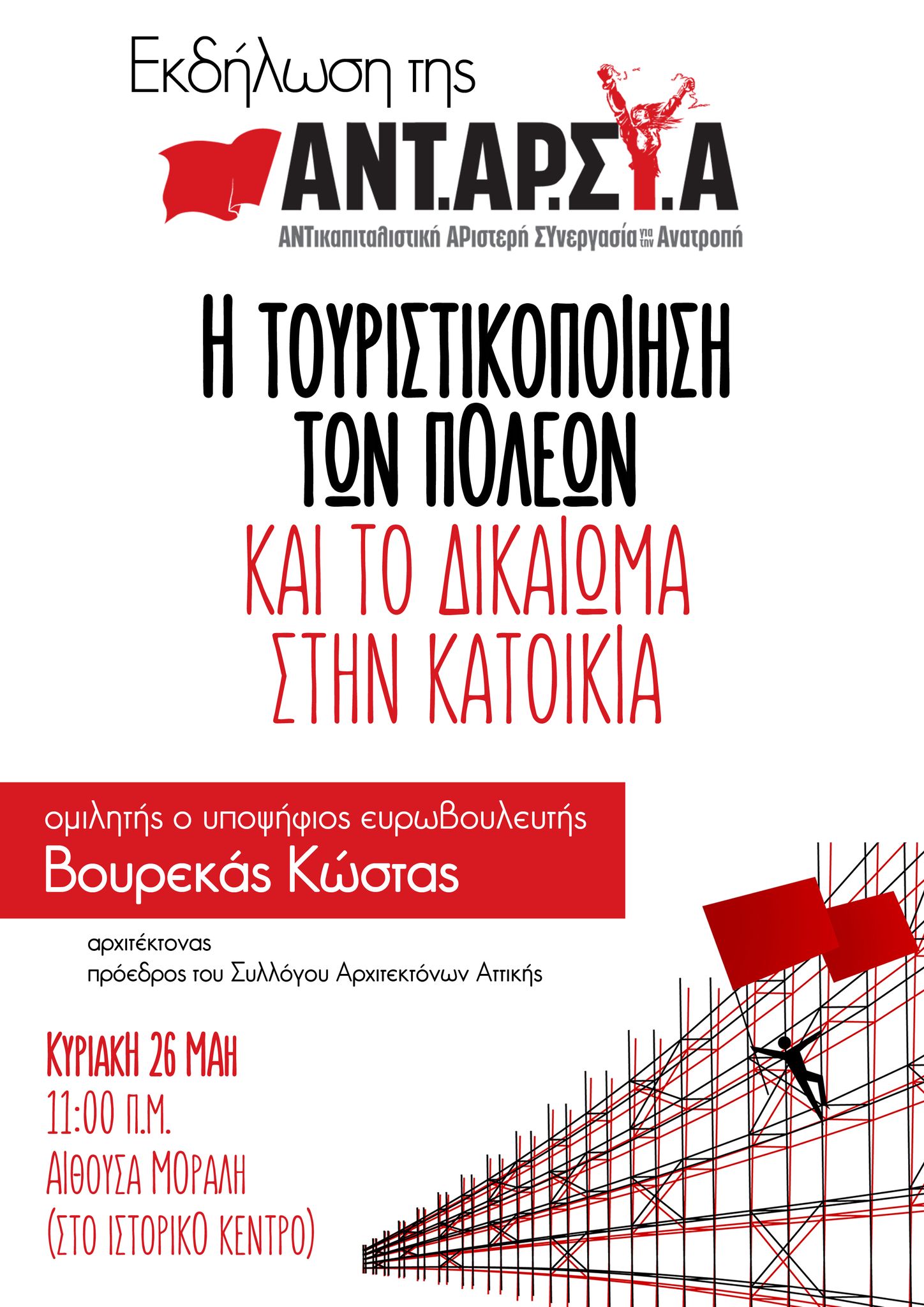- Πέμ, 20/06/2019 - 09:14
|
The intervention of Nikos Kapitsinis in the event about the EU and the Radical Left
In my political life, I have learned to structure my thought in a way that it is led by the wider long-term political strategy, connecting it with the short term more specific tactics pf everyday political life. So, if our strategy is to live in a better and more just society, which implies the overthrow of capitalism we need to analyse the opponent, the decisions of capital. A strategic move of capital is its integration in economic, financial and geographical terms. A move like this, pioneer, back then, in the 1950s, in the world, is the EU. Just a clarification here. Europe and the EU, let’s be clear, are different. So, being a European does not mean that you are in the EU, this is a significant impact of the dominant debate in the UK. Let’s be clear about terminology. Europe is a continent, defined by physical geography and geopolitics aspects, and the EU is a union of capitalist states. They have different population levels, different countries, 55 to 28 states, but the EU is expanding gradually from 6, to 15, 25, and 28 member states. Why is the EU expanding? Capital seeks new markets, fresh opportunities for deeper workers’ exploitation. How is it expanding? The candidate member states need to apply for membership and then initiate structural adjustments in their market, politics, labour market, finances, to comply with the criteria of the EU. In the left spectrum of political thought there are three stances related to the EU:
I would like to argue why the EU cannot be reformed, why fighting against the EU is important in the struggle for a better life, and why the EU is the Europe of capital. The EU has been created by capital, by capitalist governments, in detail. All started in 1945 with the initiative of Churchill, who declared the United States of Europe and then in 1952 the European Coal and Steel Community emerged. So, the foundations are clearly based on capital and markets, since coal and steel were the two industries that were most developed, at that period. And then, late-1950s, the European Economic Community was established, regulating the customs union. The EU is the integration of capital, capital created it in the post-war Europe to address the intra-capital competition, to open new markets, to signal a new era for the Europe of capital. Let’s see some aspects, which are either inherent in the character of the EU or are addressed in its constitution. Financial-fiscal terms -Fiscal stability pact: Maastricht conditionalities: 3% of GDP deficit, 60% of GDP public debt. Public debt is a very useful means for capital to impose austerity. -These entail certainly permanent austerity within the EU Political terms -The whole neoliberal agenda was passed through the EU directives -Structural adjustment programs -Privatisations, such as rail and post: industries cannot be re-nationalised within the EU -Several left positions in the UK argue that the EU is a defender of working rights. Let’s have a look -The EU has been driving wages down, sometimes increases but much lower than productivity and inflation increase, just securing the profits of corporations -Less working rights -Flexible work -Anti-trade union policies, just to recall the anti-trade union law in 2015, in the UK, within the EU, that regulated that in every trade union ballot, more than 50% of its members should participate, in order for the ballot to be legal. Educational terms -Bologna directives -Marketisation of universities -Privatisation -Increase of tuition fees -Further downgrade of degrees -More specialised and flexible workers, with less working rights, who when the conditions of the market change, they will be in a very difficult position -Assessment of universities according to private and economic terms, not the social needs Migration terms -Migration is not an opportunity; it is a necessity, since people are obliged to move. After the economies in their countries being deregulated, they are obliged to move to the core, where bosses hire them under very bad working conditions, as people are desperate, which has sometimes impact on the working conditions of people already in the core. And then some others take advantage of high paid positions, but this is not working class, this is not the majority, and they would probably move even without open borders. -In this way, corporations shift labour around countries, drive wages down, and increase the degree of exploitation -And let’s recall another example, in the UK, within the EU. What were the rights of the EU migrants in the UK during Cameron’s era? Everyone has an example of a migrant who could not have access to the benefits, which have an exclusionary character towards migrants. Imperialist role – refugees While the EU countries have stopped fighting each other, the EU has been transformed to a major imperialist power with invasions in several countries. This has entailed huge refugee flows. The concept of Europe fortress is important here, while we cannot ignore Frontex and the concentration centres. Hundred thousands of dead people in the Mediterranean Sea. Economic terms -Single market, customs union: free movement of capital, goods, and services, based on market forces -De-industrialisation: weakening the social bonds and solidarity that were developed through manufacturing -Inherent division between core and periphery Conceptualising the EU? EU is an integration of capital that benefits the economies (as a whole) of the core and deregulates the economies of the south. Capital is the winner with deeper exploitation of the working class and migrants. The EU benefits upper classes in both core and periphery, mainly in the core, while the big losers are the working-class people in both core and periphery. How? Apart from the previous terms, there is the following inherent and structural process of the EU. In the open market we have foreign investments and migrant flows. The peripheral economies had structural weaknesses before the integration which expanded within the single market. Then, they saw a deregulation of the productive structure and huge unemployment, which brought migration of people from the periphery to the core. On the other hand, we saw migration of capital from the core to the periphery. Capitalists take advantage of desperate people, offering low paid jobs with weak working rights. Eurozone was one step forward for capital. It has deepened austerity with stricter fiscal criteria, and implied lower interest rates for workers. Therefore, it has been driving down wages, increasing subprime lending, and expanding the debt of households. In summary, the open borders, the integration, the flows, are all for the capital in the EU. This is what we should respond to the left that is afraid to speak about the EU. The EU is internationalist, yes, but it is internationalist for capital. From this perspective, we need to defend all the people who were forced to migrate, in every country. But all the migrants, we should forget neither the visas for the overseas people, nor the refugees. There is not a single convincing argument for not speaking about the EU. So, what should we do? The main question that needs to be addressed is what the left actually wants. Europe of capital or Europe of people? If the left wants a better society, it cannot be in favour of the EU. What has been happening in the EU till now? Unfortunately, the big dissatisfaction about the EU, which exists in all the EU member states, has been absorbed by the far-right parties which speak about national democracy. Why? -Since the left has been afraid to lead the anti-EU struggle, due to the weaknesses of the left. Most left support the EU. Important here, is to examine whether there is an alternative within the EU. The example of SYRIZA in Greece is illustrative. People were surprised in 2015 when the Greek government decided to reverse the result of the referendum and apply austerity, but we should not forget that SYRIZA is a pro-EU party. This explains all the events after the referendum. And then people just punished them in the euro elections -This absorption of dissatisfaction from the far right is also a strategy of the capital. We should not forget that the far right has historically been a very useful weapon for capital, a strong ally. After the 2007 capitalist crisis, the far-right parties recorded significant growth. Then, the neoliberal and ex-social-democrat forces took advantage of this and now highlight the dilemma to the working class people: Do you want the unified EU or a divided Europe based on nationalist ideas? Regardless of the rhetoric of the far right, we know their agenda which is always serving the capital, be careful within the EU! The examples of Hungary, where Orban voted 400 hours of compulsory overtime annually, paid only after negotiations with the boss, and Austria, where the right and far right coalition regulated the 12 hours working day (within the EU, just to respond to the argument the EU supports working rights), are illustrative. This is the far right. It targets the foreign workers, it is racist against the poor, to destroy the whole working class. It seeks to renegotiate the position of the upper class of each country within the EU. In the UK, several trade unions have opposed the EU, like RMT, however, the big unions, UNITE, Unison, have supported the it, perceiving it as an umbrella of the working rights, such as maternity and paternity pay and leave, the right to paid leave for holidays, a working week limited to on average 48 hours a week. Apart from the examples of Austria and Hungary and other compelling evidence about the negative impacts of the EU on working rights, there is the question about whether this is what we want. This is not an argument for fighting to stay in the EU, it is evidence that speaks to stronger working struggles to make it 30, 25 and 20 hours per week, not to stay in the EU. In my opinion, the left, especially in the UK, has been afraid to speak about the EU, as they would be considered as racist. And what has been the outcome? The great weakness of left groups speaking only anti-austerity, not putting into the game the bosses and capital, not targeting the deeper scopes of capital and the EU, even to condemn them politically. In the referendum, some of them, supported the Remain, claiming that the left cannot ask now for an exit from the EU, when it does not have the power. This is a significant proof of no connection between strategy and tactics. Then we should question the participation of the left in the elections, as according to the argument, the left program and demands cannot be implemented. From this perspective, this is also an extreme lack of faith and determination. After the referendum, things got really bad. Few left voices in terms of Brexit, the discourse has been dominated by others, while on top of this, several left people support the Brexit party of Farage. Addressing the three positions about the EU, remain, ignore, or fight against, I think that we need to demand an internationalist, working class and migrants’ friendly, overthrow of the EU. Accounting for the connection between tactics and strategy means that believing that the EU can be reformed entails the belief that the system can be also reformed. There is an issue of wider political stance, here. The Radical Left needs to structure the strategy, to adjust the tactics and the struggles of everyday life based on this strategy, to support the working class for a better life, out of the EU, without exploitation, since there is no improved life within the EU; the latter cannot be reformed. The EU has its own structural features and rules, it is impossible to reform them. Overthrowing the EU is a crucial step in the wider anti-capitalist struggle, towards a more just, fair, equal society, but of course it does not certify it. So, it is a necessary, but not sufficient step. From this perspective, questioning the EU should be associated with the bigger question about who owns the economy. If the Left does not ask this question, then the chances to get into the nationalist trap increase dramatically. Overthrowing the EU is not sufficient on its own. The overthrow of the EU should be associated with a wider spectrum of immediate demands that would relieve working class people, such as write off the public debt, public health and educational system, nationalisation of the banking sector and key industries under workers’ control, decent jobs, rise in wages and pensions, stable work with rights against the flexible work, against fascism, racism, and war. All these simply cannot happen within the EU. How to do it? We need to create anti-EU initiatives in each EU member state which will be connected with the labour movement and then be unified at a European wide level. From this perspective, we need to fight for the overthrow of the EU, not just the exit of a country. In this way, the Radical Left can highlight the wider role of the EU, weaken far right and nationalist ideas, and connect this fight with the wider struggle. Can we do it in the UK? I think that there is always time. We need more imagination, to vision another type of society and economy. We need to get stronger by the result of the referendum and change the things. This popular ‘the country is divided’ is in reality a class divide, the poor said enough with this, ‘we are fed up’, we cannot offer these people to the far right! However, we need the left to start organising and mobilising the working class, otherwise others will do it, as they already do. Several times the Radical Left postpones discussions and actions for crucial issues, like the EU or even the social change, to the future, like they cannot happen anytime. However, this is a methodological mistake! Labour movement trajectory is not linear, its historical trajectories have been full of wild fluctuations! This is a certain weakness of the Left. Moreover, we are not at this stage at the moment. The issue of the EU is now, more topical than ever, especially after Brexit. This dilemma Remain in the EU or Brexit under Tories is fake. We just need to respond immediately. We need to act now, to mobilise the working class for an internationalist workers and migrant friendly anti-EU, European wide struggle, otherwise history, once again, will not treat both the society and the left in a good way. We can always win!
Categories: |












